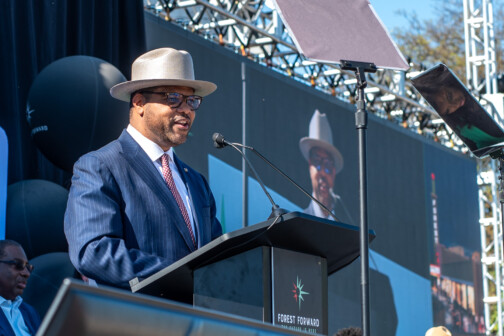Listen to Phil Ritter for 10 minutes, and you start to get the idea that you are seriously out of date. Listen to him for 20 minutes, and you start to get excited.
Ritter spent several months considering whether to leave his executive perch at TI to take a run at the mayor’s job next year. In his methodical TI way, he studied the current state of the city, toting up its assets and liabilities. Like me, he found much to admire in how rapidly City Manager Mary Suhm has moved to reorder the city’s budget and to transform the culture at City Hall. That’s on the positive side. On the negative side, he discovered that the nature of business in this interconnected age has radically reordered industries and regional economies, and Dallas has been slow to respond.
What happened? Consolidation happened, followed by globalization. Ten years ago I wrote that the owners who once led the Dallas business community had been replaced by CEOs. That was consolidation. CEOs couldn’t be expected to act with the same attitudes and civic commitment as owners once had. Now, with globalization, they don’t have the time to act at all.
The fact is well-known. The question is what to do about it.
“Have you read The World is Flat?” Ritter asked me.
I nodded. As he started to analyze how the book’s lessons could be applied to the problem of business leadership, I realized I hadn’t read the book, I had only read about the book. (I can now report that I have read the book, and it scared the pants off me.)
“The speed of change is now at a pace that even those of us in the high-tech business can barely keep up with it,” Ritter said. “Dallas businesses are at the forefront. Yet the Dallas business community is operating through civic institutions set up in the 1930s or before.”
Two months ago I wrote a column in which I asked “Who Speaks for Dallas?” While every suburb and town has a chamber of commerce, the Greater Dallas Chamber had made itself into a regional player, leaving economic development in Dallas to the city government staff. I argued that Dallas needs its own business group to promote the city.
Ritter thinks I am thinking too small—or rather, that I’m thinking conventionally at a time when the conventions are being overthrown. The whole notion of “chambers of commerce” seems outmoded in a flattened world.
As a case in point, the venerable Dallas Citizens Council today is barely a shell of its former self. What else could we expect? It was designed to be an organization of owners, and there are no owners left. Our major enterprises are run by CEOs, and a CEO is just as likely to be in Bangalore or New York or Shanghai this week as he is to be in Dallas. So the Citizens Council is left with no one to counsel with, as witnessed by the fact that its three most recent chairs have been a lawyer, a bank employee, and an insurance agency executive.
That doesn’t mean our top business leaders don’t care about Dallas. They do, and many of them care passionately. This is their home, it is where their children go to school, and it is where their top employees live and work. They want Dallas to prosper and grow because they want to live in a city that is vital, culturally exciting, and full of opportunity.
So how to square the circle? Business leaders have quietly dropped out of the business institutions set up in the old days to manage business involvement in the city. But the city still desperately needs business involvement. Top corporate leaders want to be involved, but they don’t have the time or the incentives (when Dallas only provides a tiny portion of their revenues).
I don’t have the answer. So I’ve asked Phil Ritter to explore the question in a series of columns here in DallasCEO, premiering next month. How do we deploy public and private money to keep Dallas competitive for industry and jobs? How do we improve the quality of our labor pool? How do we attract young leaders of the caliber of a Walt Humann, who has led so capably on transportation issues, or Charles Terrell, who has marshaled the city to reduce the crime rate? How do we reshape our civic institutions to fit today’s realities?
The first step to a solution to any problem is to face up to the fact that the problem exists. Now that I’ve read The World Is Flat, I can tell you the problem not only exists, but that it’s coming at us like a kamikaze.





